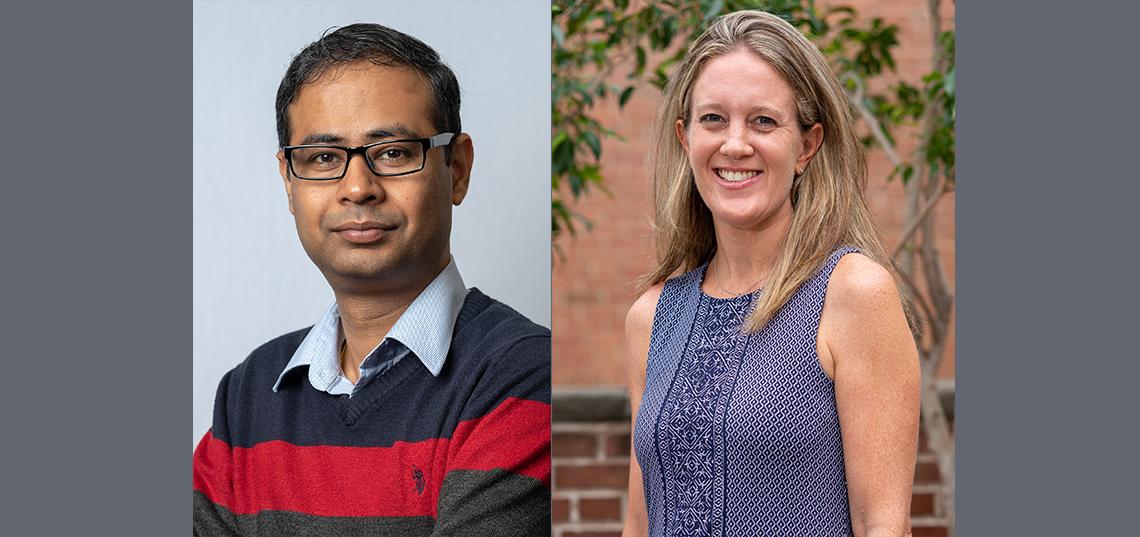
The consumption of information globally is at its highest level in history, given the rise of technologies that support the distribution and amplification of information, through the internet, social media, and other means. However, the reliability of the information we read, watch, and listen to is sometimes questionable, and the ways “poor information” is most likely impacting our lives are probably far too numerous to count. How, for instance, do we know news articles we read are from the sources they claim to be and are accurate? The quality of the information we consume has serious and far-ranging consequences in terms of our beliefs and behaviors.
To research the ways algorithms are being used and could be used to help determine the quality of different types of information, SC&I’s Associate Professor of Journalism and Media Studies Lauren Feldman and Assistant Professor of Library and Information Science Vivek Singh, have formed an interdisciplinary research team at SC&I, and have been awarded a grant of nearly $300,000 from the National Science Foundation (NSF) for their project “Fair and Accurate Information Quality Assessment Algorithms.” Vivek Singh is the PI for the project and Lauren Feldman is a Co-PI for this grant which will run from June, 2019 through May, 2021.
The goal of their research, they said, is “to ensure that algorithms that assess the quality of information in online articles are not biased, based on the topic of the article, or its ideological alignment. For instance, we do not want situations where the information quality assessment algorithm is 99% accurate when dealing with left-leaning articles but only 60% accurate when dealing with right-leaning articles.”
They will also be developing algorithms to detect poor quality information, Singh said, describing the definition of what makes information poor. “Information quality is often defined as the ‘fitness for use of the information provided. ‘Poor information’ would hence be information that is not suitable for the task at hand. This clearly varies based on the application. In some cases, ‘poor information’ would be biased; in other cases, it would be false, and in some others it would simply not be falsifiable. We will be utilizing multiple factors to identify ‘poor information’ in the online media environment and perhaps even expand on the definition of ‘poor information.’”
The general public will benefit from the development and use of these algorithms, they explained, because “Decision making based on poor quality information misinforms the public, deepens societal divisions, and can lead to radicalization and violence. Hence, vetting and verifying online information is important for all sectors of society.”
Describing the ways the project will advance the field of information and computer science, and communication and journalism, they said, “It would help broaden the definitions of ‘information quality’ and ‘fairness’ of algorithms. It would also help identify the common patterns in online news and communication that are associated with poor quality information. It would help us identify how communication targeted to different audiences differ from each other. Finally, it would result in empirical findings and software code to be shared with other researchers and organizations working in similar spaces.”
Singh and Feldman plan to share their findings widely, including with multiple news agencies, social media companies, and policy designers. They said they will also make their findings and software publicly available, making it up to the organizations to adapt and implement the algorithms on their platforms as appropriate.
Another possible outcome of their research could be regulation. Asked if in the future the use of these algorithms could become mandatory and governed by regulations in order to keep information in cyberspace accurate, they answered, “Yes, that’s a possibility. Just like the laws and policies designed to ensure online privacy, we might see more laws pertaining to online information quality. However, any such law should be mindful of the need to protect citizens’ privacy and freedom of expression, as well as of the limitations of relying exclusively on an algorithmic approach for improving online information quality.”
Ultimately, they said, “We hope that we will contribute towards a more truthful and more fair ICT (Information Communication Technologies) eco-system.”
Feldman and Singh have already involved SC&I undergraduates and graduate students in their research, explaining, “A supplementary grant from NSF specifically supports the research experience for undergraduate students. They are helping us design the framework for classifying online articles that will be used to develop and test the algorithms. Importantly, the undergraduate and graduate students involved with the project will have the opportunity to learn about a discipline outside of their major/area concentration (i.e., information science or journalism/media studies). Both PIs will incorporate the findings from this research into their classes. Singh plans to include the findings in his classes on Data Analytics and Social Media. Feldman plans to discuss the research in her courses on News, Entertainment, and Politics, and Media, Science, and Public Engagement.”
Explaining the factors that led the two of them to work together to propose this project, they said, “We appreciate each other’s expertise in media/journalism and algorithm design and felt that such an interdisciplinary approach was integral for the success of this project. All too often, the study of the online information environment is siloed within particular disciplines, which can result in blind spots. Inter-disciplinary collaboration can enrich the study of information quality in important ways. The unique organization of the School of Communication and Information, which brings together experts in information science and journalism under a common umbrella, was the catalyst in supporting this project.”
For more information about the Rutgers School of Communication and Information (SC&I) Journalism and Media Studies Department, click here, and to learn more about the Department of Library and Information Science click here.
